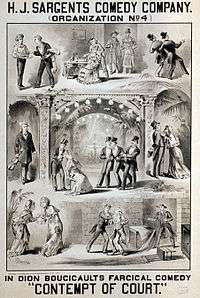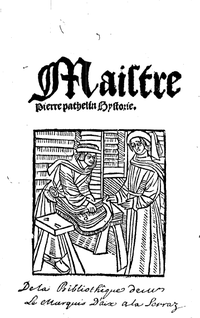Farce
In theatre, a farce is a comedy that aims at entertaining the audience through situations that are highly exaggerated, extravagant, and thus improbable.[1] Farce is also characterized by physical humor, the use of deliberate absurdity or nonsense, and broadly stylized performances. It is also often set in one particular location, where all events occur. Farces have been written for the stage and film.
.jpg)

The term farce is derived from the French word for "stuffing", in reference to improvisations applied by actors to medieval religious dramas. Later forms of this drama were performed as comical interludes during the 15th and 16th centuries.[2] The oldest surviving farce may be Le Garçon et l'aveugle (The Boy and the Blind Man) from after 1266, although the earliest farces that can be dated come from between 1450 and 1550. The best known farce is La Farce de maître Pathelin (The Farce of Master Pathelin) from c. 1460.[3]
Examples
Classical antiquity
- Satyr play
- Phlyax play
- Menander's Dyskolos (The Grouch)
- Atellan Farce
- Plautus' Aulularia (The Pot of Gold)
- Querolus
Britain
- Anonymous: The Second Shepherds' Play (14th century)
- Chaucer: The Canterbury Tales (14th century)
- William Shakespeare: The Comedy of Errors (c. 1592)
- Aphra Behn: The Rover (1677)
- Henry Fielding: The Author's Farce (1730)
- Arthur Murphy: The Citizen (1761)
- Samuel Foote: The Liar (1762)
- Elizabeth Inchbald: Appearance Is Against Them (1785); The Wedding Day (1794)
- John Maddison Morton: Box and Cox (1847)
- Charles Dickens: The Lamplighter (1879)
- Arthur Wing Pinero: The Magistrate (1885)
- Brandon Thomas: Charley's Aunt (1892)
- J. M. Barrie: Walker, London (1892)
- Oscar Wilde: The Importance of Being Earnest (1895)
- Ben Travers: Thark (1927)
- Noël Coward: Hay Fever (1925); Present Laughter (1939); Blithe Spirit (1941)
- Thornton Wilder: The Matchmaker (1954)
- Philip King: See How They Run (1945); Big Bad Mouse (1957); Pools Paradise (1961)
- Henry Lewis, Jonathan Sayer, and Henry Shields: The Play That Goes Wrong (2012)
- Peter Shaffer: Black Comedy (1965)
- Joe Orton: Loot (1967) What the Butler Saw (1969)
- Michael Pertwee: Don't Just Lie There, Say Something! (1971)
- Anthony Marriott and Alistair Foot: No Sex Please, We're British (1975)
- John Cleese and Connie Booth: Fawlty Towers (1975)
- John Chapman and Anthony Marriott: Shut Your Eyes and Think of England (1977)
- Alan Ayckbourn: Taking Steps (1979)
- Tom Stoppard: On the Razzle (1981)
- Derek Benfield: Touch and Go (1982)
- Michael Frayn: Noises Off (1982)
- Nigel Williams: W.C.P.C. (1982)
- David Croft and Jeremy Lloyd: Are You Being Served? (1972–1985); 'Allo 'Allo! (1982–1992)
- Ken Friedman: Claptrap (1983)
- Andrew Norriss and Richard Fegen: Chance in a Million (1984)
- Miles Tredinnick: Laugh? I Nearly Went to Miami! (1986)
- Alan Ayckbourn: A Small Family Business (1987)
- Miles Tredinnick: It’s Now Or Never! (1991)
- Tom Kempinski: Sex Please, We're Italian! (1991)
- Ray Cooney: Funny Money (1994)
- Simon Pegg and Jessica Hynes: Spaced (1999–2001)
- Steven Moffat: Coupling (2001)
- Richard Bean: One Man, Two Guvnors (2011)
- Miles Tredinnick: Up Pompeii! (2011)
China
- Xu Zhuodai, "The Fiction Material Wholesaler" (1921 story)[4]
- Zhang Tianyi, "The Bulwark"[5]
- Zhang Tianyi, "The Pidgin Warrior" (1936 novel)[6]
- Zhang Tianyi, "Mr. Hua Wei" (1938 story)
- Yang Jiang, "Forging the Truth" (1944 stage play)
- Devils on the Doorstep (Jiang Wen, dir., 2000)
- God of Cookery (Stephen Chow, dir., 1996)
- Kung Fu Hustle (Stephen Chow, dir., 2004)
France

- The Boy and the Blind Man, 13th century, oldest written French farce.
- La Farce de maître Pierre Pathelin (c. 1457)
- The Liar (Corneille) (1644)
- Molière: Tartuffe (1664)
- Molière: The Miser (1668)
- Labiche: La Cagnotte (1864)and other plays.
- Alfred Hennequin and Alfred Delacour: Le Procès Veauradieux (1875)
- Georges Feydeau: Le Dindon (1896) (a.k.a. Sauce for the Goose)
- Octave Mirbeau : Farces et moralités (1904).
- Georges Feydeau: A Flea in Her Ear (1907)
- Marc Camoletti: Boeing Boeing (1960) and Pyjama pour Six (1985) (a.k.a. Don't Dress for Dinner)[7]
- Jean Poiret: La Cage aux Folles (1973)
Germany
- Carl Laufs and Wilhelm Jacoby: Pension Schöller (1890)
- Franz Arnold and Ernst Bach: Wochenende im Paradies (1928)[8]
- Miles Tredinnick with Ursula Lyn and Adolf Opel: ...Und Morgen Fliegen Wir Nach Miami (1987)
India
Theatre
Farces are particularly popular in Marathi and Gujarati language theatre. A few such examples:
- Zopi Gelela Jaga Zala (1958)
- Dinuchya Sasubai Radhabai (1960)
- Pala Pala Kon Pudhe Pale To
- Gholaat Ghol
Film
- Gol Maal (1979)
- Angoor (1982)
- Jaane Bhi Do Yaaron (1986)
- ChaalBaaz (1989)
- Andaz Apna Apna (1994)
- Chachi 420 (1997)
- Baadshah (1999)
- Haseena Maan Jaayegi (2000)
- Hadh Kar Di Aapne (2000)
- Hera Pheri (2000)
- Awara Paagal Deewana (2003)
- Hungama (2003)
- Hulchul (2004)
- Kyaa Kool Hai Hum (2005)
- No Entry (2005)
- Maine Pyaar Kyun Kiya? (2005)
- Malamaal Weekly (2006)
- Chup Chup Ke (2006)
- Welcome (2007)
- Dhamaal (2007)
- De Dana Dan (2009)
- Ajab Prem Ki Ghazab Kahani (2009)
- Housefull (2010)
- Tere Bin Laden (2010)
- Housefull 2 (2012)
- Bol Bachchan (2012)
- Tanu Weds Manu: Returns (2015)
- Gujjubhai the Great (2015)
- Bareilly Ki Barfi (2017)
Television
- Idhar Udhar (1985–1988)
- Dekh Bhai Dekh (1993–1994)
- Khichdi (2002–2004)
- Instant Khichdi (2004–2006)
- Sarabhai vs Sarabhai (2004–2006)
- Kareena Kareena (2004–2005)
- F.I.R. (2006–2015)
- Taarak Mehta Ka Ooltah Chashmah (2008–present)
- Sajan Re Jhoot Mat Bolo (2009–2012)
- Golmaal Hai Bhai Sab Golmaal Hai (2012)
- Comedy Nights with Kapil (2013–2016)
- "The Kapil Sharma Show" (2016–present)
Italy
- Dario Fo: Morte accidentale di un anarchico also known as Accidental Death of an Anarchist was first played on December 5, 1970 in Varese, Italy.
Japan
- Japan has a centuries-old tradition of farce plays called kyōgen. These plays are performed as comic relief during the long, serious Noh plays.
Pakistan
Theatre
Following stage shows of Umer Shareef are extremely popular:
- Bakra Qistoon Pay
- Buddha Ghar Pe Hai
- Yes Sir Eid, No Sir Eid
Television
- Akbari Asghari (2011)
- Aunn Zara (2013)
- Azar Ki Ayegi Baraat (2009)
Poland
Russia
- Nikolai Gogol: The Government Inspector (also translated as The Inspector General; 1836)
- Anton Chekhov: The Bear (1888), A Marriage Proposal (1890) and The Cherry Orchard (1904)
- Mikhail Bulgakov: The Master and Margarita (published 1967)
Spain
- Cervantes Saavedra Don Quixote
- Mortadelo y Filemón
United States
Film
- 101 Dalmatians (1996)
- Airplane! (1980)
- The Bank Dick (1940)
- Burn After Reading (2008)
- Clue (1985)
- Destiny Turns on the Radio (1995)
- Freaky Friday (1976)
- Good Neighbor Sam (1964)
- Harold & Kumar Go to White Castle (2004)
- Herbie Rides Again (1974)
- Hot Tub Time Machine (2010)
- It's a Mad, Mad, Mad, Mad World (1963)
- The Love Bug (1968)
- The Mating Season (1951)
- Million Dollar Baby (1941)
- Million Dollar Mystery (1987)
- Monkey Business (1931)
- Never Give a Sucker an Even Break (1941)
- No Deposit, No Return (1976)
- Noises Off (1992)
- Now You See Him, Now You Don't (1972)
- Oscar (1991)
- The Pink Panther (1963)
- Problem Child (1990)
- Radioland Murders (1994)
- Rat Race (2001)
- The Shaggy Dog (1959)
- Unfaithfully Yours (1948)
- What's Up, Doc? (1972)
- Wild Wild West (1999)
- Wet Hot American Summer (2001)
- Hot Rod (2007)
- Sex and the Single Girl (1964)
Television
- Three's Company (1977–1984)
- 30 Rock (2006–2013)
- Happy Days (1974–1984)
- Two Guys and a Girl (1998–2001)
Theatre
- Giannina Braschi: United States of Banana (2015)
- Abe Burrows: Cactus Flower (1965)
- Marc Camoletti: Don't Dress for Dinner (1991)
- Christopher Durang: Beyond Therapy (1981)
- Michael Frayn: Noises Off (1982)
- Joseph Kesselring: Arsenic and Old Lace (1941)
- Ken Ludwig: Lend Me a Tenor (1989) / Leading Ladies (2004)
- David Mamet: Romance (2005)
- Terrence McNally: The Ritz (1975)
- Larry Shue: The Nerd (1981) / The Foreigner (1983)
- Trey Parker, Robert Lopez, and Matt Stone: The Book of Mormon (2011)
- Allen Boretz and John Murray: Room Service (1937)
- Neil Simon: Rumors (1988)
- Larry Gelbart and Burt Shevelove: A Funny Thing Happened on the Way to the Forum, music and lyrics by Stephen Sondheim (1962)
- Orson Welles: Horse Eats Hat (1936)
- Mark Twain: Is He Dead? (1898)
References
- "farce - Free On-Line English Dictionary - Thesaurus - Children's, Intermediate Dictionary - Wordsmyth".
- Birch, Dinah, ed. (2009). The Oxford Companion to English Literature (7th ed.). OUP Oxford. p. 1043. ISBN 0191030848.
- Hollier, Denis; Bloch, R. Howard, eds. (1994). A New History of French Literature. Harvard University Press. p. 126. ISBN 0674615662.
- Christopher Rea, "The Age of Irreverence: A New History of Laughter in China" (University of California Press, 2015), ch. 5: "Farce"
- Tianyi, Zhang (1918–1948). The Bulwark. New York: Columbia UP.
- "Zhang Tianyi's Swindling for National Salvation".
- "Bio Camoletti". Archived from the original on 2004-07-01. Retrieved 2006-05-08.
- "Weekend im Paradies von Franz Arnold und Ernst Bach". Felix Bloch Erben GmbH & Co. KG - Theater-Verlag Desch.
- European Authors 1000–1900. The H. W. Wilson Company, Bronx, 2000. ISBN 0-8242-0013-6.
- Teresa Murjas (2007). "Zapolska, Gabriela: The Morality of Mrs. Dulska". The University of Chicago Press Books. Archived from the original on 2007-05-20. Retrieved 2007-11-26.
- August Grodzicki, "Bardzo polska tragikomedia." Życie Warszawy nr 5; 07-01-1976
External links
| Look up farce in Wiktionary, the free dictionary. |